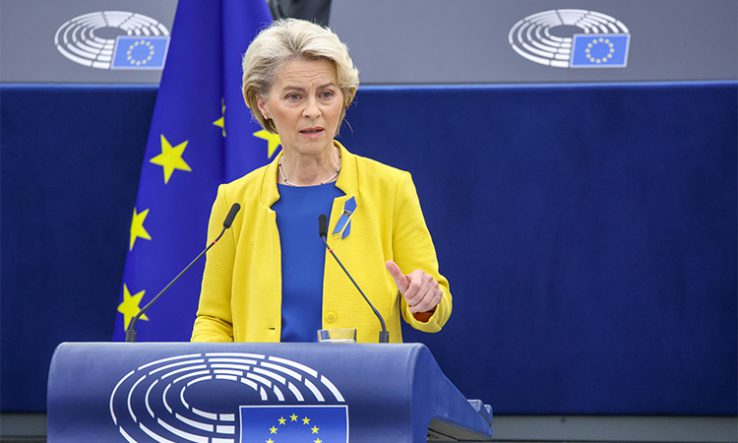
Image: European Union
Commission president voices support for basic research, with prizewinner having struggled for funding
European Commission president Ursula von der Leyen has underscored the importance of basic science after the Nobel Prize for Medicine was awarded for research that led to the development of Covid-19 vaccines.
On 2 October, Katalin Karikó and Drew Weissman were awarded the prize for their work on how the body responds to the genetic material called messenger RNA. They paved the way for mRNA to be used for vaccines, including some of those that helped the world bring the Covid pandemic under control.
Von der Leyen (pictured) said on social media that recognition by the Nobel committee “shows the crucial role of science in defeating Covid-19 and liberating the world from the pandemic”. She also shared an excerpt of a speech she gave at the Nobel Prize Summit in 2021, describing Karikó’s struggles to win funding and urging governments to support basic research.
“Back in the 1990s, the mother of mRNA vaccines, professor Katalin Karikó, had a hard time finding money for her research,” von der Leyen said in the speech.
“Our scientists must have the freedom to explore the frontiers of knowledge, and for this, governments must support pure science and basic research. This is the foundation of human progress,” she added.
Pure vs applied support
The European Commission has recently come under fire from university groups for not putting enough emphasis on supporting basic research through its Horizon Europe research and innovation programme, and instead prioritising applied research linked to the bloc’s political goals.
In her 2021 speech, after the section posted in response to Karikó and Weissman’s Nobel award, von der Leyen went on to say that “alongside pure science, we need transdisciplinary science”, and that Horizon Europe had been developed with this in mind.
Her speech also mentioned the launch of five missions under Horizon Europe, which were introduced to increase the impact of EU R&I on topics including climate change and cancer. These have not yet been fully embraced by Europe’s research sector.
Karikó’s struggles
According to reports, Karikó’s journey to becoming a Nobel prizewinner was not straightforward.
Born in Hungary, she moved to the United States, where she worked with Weismann at the University of Pennsylvania. Karikó told Science magazine that in the early 2000s she did not have her own research team and did the biochemistry experiments behind some of the key work with her own hands.
In a 2020 interview with US medical news outlet Stat, Karikó said: “Every night I was working: grant, grant, grant…And it came back always ‘No, no, no.’”
She also talked about being demoted in 1995 after having been on the faculty at the University of Pennsylvania.
“Usually, at that point, people just say goodbye and leave because it’s so horrible,” Karikó told Stat, adding that she decided she just needed to do better experiments.
EU funding for physics winners
On 3 October it was announced that Pierre Agostini, Ferenc Krausz and Anne L’Huillier shared the 2023 physics Nobel prize for experiments with light that the committee said “have given humanity new tools for exploring the world of electrons inside atoms and molecules”.
Krausz and L’Huillier have both received funding from the EU’s European Research Council, with L’Huillier winning three ERC Advanced Grants and three Proof of Concept grants, worth a total of €7.1 million, and Krausz winning an Advanced Grant worth €2.5m. Together they have also participated in 14 Marie Skłodowska-Curie projects, the Commission said.
The EU research commissioner Iliana Ivanova said: “This showcases the importance of funding eminent researchers and giving them the resources they need to succeed in their scientific endeavours to the benefit of humankind.”
ERC president Maria Leptin added that the awards success “shines a light on the outstanding talent hosted in Europe and on the need for the EU to keep investing in the best free fundamental research that is cutting new ground”.